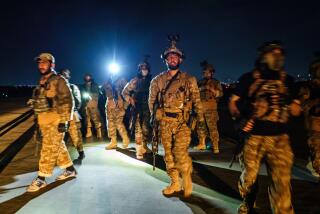Pakistani Taliban’s choice of leader signals an ominous turn
- Share via
ISLAMABAD, Pakistan — The appointment of Mullah Fazlullah as head of the Pakistani Taliban signals a significant shift for the militant organization into a potentially more uncompromising, violent group based increasingly on ideology rather than tribal ties, analysts said.
Fazlullah, a hard-liner from Pakistan’s Swat Valley, was named Thursday after his predecessor was killed days earlier by a U.S. drone strike as he emerged from a meeting at a mosque in lawless North Waziristan near the Afghan border.
“This is a very calculated step by the Taliban meant to transform it from a tribal to an ideological group,” said Zia Ur Rehman, a Karachi-based journalist and analyst in Swat. “This new leadership will make it into a more religious organization with clear motives.”
Fazlullah, known as “Radio Mullah” for his fiery sermons on an illegal FM radio network, is the first Taliban leader from the heart of Pakistan rather than the restive northwest tribal areas where the group has traditionally drawn its strength. He is a harsh critic of the Pakistani government who is expected to aggressively pursue his goal of replacing it with one driven by his harsh version of Islamic law.
But analysts said his weak tribal ties could leave him vulnerable in any power struggle among the 30 or so factions under the Pakistani Taliban umbrella.
A taste of his vision of an ideal Pakistan can be seen in the parallel state he created in Swat from 2007 until early 2009, when the army pushed him and hundreds of his fighters across the border into Afghanistan, where he remains. Under his rule, Swat saw a stream of kidnappings, public whippings, torture and beheadings. Some executions were announced in advance over his radio station, which was shut down after he fled.
Since 2009, Fazlullah has continued to order killings from Afghanistan. In September, his fighters killed a Pakistani army general and a lieutenant colonel in a roadside bomb attack, which he celebrated in a video.
He is also believed to have ordered the shooting of schoolgirl Malala Yousafzai as she rode a bus last year in Mingora, Pakistan. The attack backfired when Malala survived, became a global spokeswoman for girls’ and women’s education and was nominated for the Nobel Peace Prize. His group has said it will try to kill her again if given the chance.
Ahmad Shah, head of a private school organization in Swat, said Fazlullah’s appointment to replace the recently slain Hakimullah Mehsud was bad news for Swat residents. “He destroyed 400 schools, banned polio vaccinations, stopped women from going to markets,” he said. “He flogged people openly, including women, and executed scores of people in public.”
Shah said about 60 social activists, Taliban critics and members of peace groups had been targeted in the last two years. “I fear an upsurge in such activities now,” he added. “He is ruthless and will convert the Taliban into a more dangerous organization.”
Sheik Khalid Haqqani, who headed the Haqqani Taliban faction before merging it into the mainstream Taliban, was named as Fazlullah’s second in command. “He is known as a religious scholar in Taliban ranks and is very well respected,” said a Taliban member, who requested anonymity.
Analysts said the Pakistani Taliban, loosely affiliated with its Afghan counterpart but operationally distinct, has become more hard line with each new leader. “Hakimullah Mehsud was more extreme than Baitullah Mehsud, while Fazlullah is a hard-liner of a different order,” said Hasan Khan, an Islamabad-based analyst. “He’s a totally ideologically motivated fighter.”
Baitullah Mehsud was killed in a drone strike in 2009, when he was succeeded by Hakimullah Mehsud.
Fazlullah is expected to order revenge attacks for the killing of his predecessor. He blames the Pakistani government for cooperating with Washington on drone attacks. His possible targets include government and military installations in Islamabad, the capital, and eastern Punjab, Pakistan’s most populous province and home region of Prime Minister Nawaz Sharif. Some are also bracing for more strikes on the country’s Shiite Muslim minority, in keeping with Fazlullah’s vision of a Sunni Muslim state.
“Military chiefs, top politicians and top government officials in Islamabad and Punjab are our specific targets,” interim Taliban head Asmatullah Shaheen told news organizations Thursday, adding in an oft-repeated claim that ordinary people need not fear, even though thousands have been killed. “We will not target civilians, bazaars or public places.”
A Taliban member who asked not to be identified said Fazlullah was a compromise candidate after two factions of the Taliban majority Mehsud tribe couldn’t agree. Initially he refused, but was persuaded by members of the ruling council. Unlike his predecessor, Fazlullah has reportedly made it clear that talks with the government are out. “He is very clear that dialogue is no longer possible,” the Taliban official said.
Fazlullah, whose given name is Fazal Hayat, was born in 1973 in Imam Dherai village in Swat Valley. He remained in school until grade 11 before joining a seminary in Lower Dir district run by Maulana Sufi Mohammad, leader of the Tanzim Nifaz-e-Shariat-e-Mohammadi group. During his five years at the seminary, he grew close to Sufi Mohammad, marrying his daughter.
When Fazlullah’s elder brother was killed in a drone strike in 2007, he also married his brother’s widow. In 2001, Fazlullah joined Sufi Mohammad and about 10,000 other Pakistanis in fighting against U.S.-led forces in Afghanistan. He launched his radio station in 2005 to spread his extremist views in Swat Valley before ramping up militant activities.
Special correspondent Sahi reported from Islamabad and Times staff writer Magnier from New Delhi.
More to Read
Sign up for Essential California
The most important California stories and recommendations in your inbox every morning.
You may occasionally receive promotional content from the Los Angeles Times.










